Rong Chai
Medical Image De-Identification Benchmark Challenge
Jul 31, 2025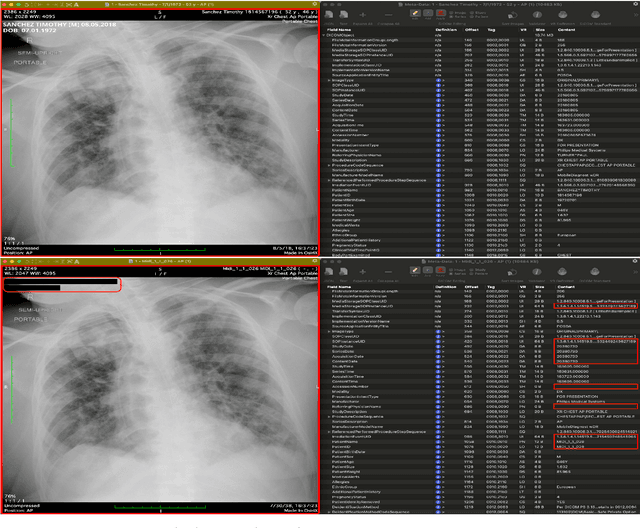


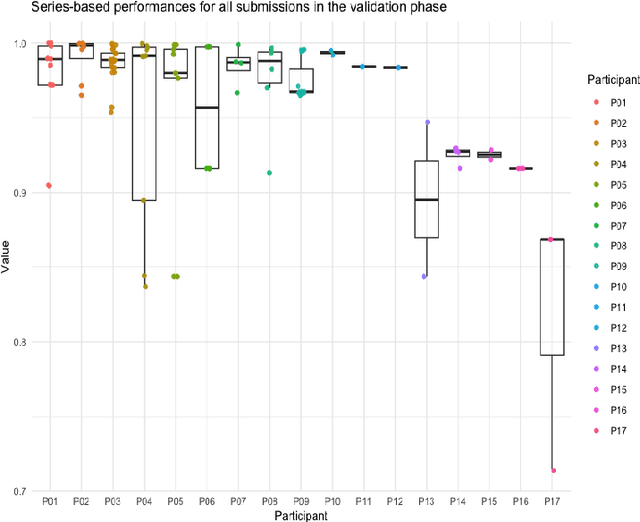
Abstract:The de-identification (deID) of protected health information (PHI) and personally identifiable information (PII) is a fundamental requirement for sharing medical images, particularly through public repositories, to ensure compliance with patient privacy laws. In addition, preservation of non-PHI metadata to inform and enable downstream development of imaging artificial intelligence (AI) is an important consideration in biomedical research. The goal of MIDI-B was to provide a standardized platform for benchmarking of DICOM image deID tools based on a set of rules conformant to the HIPAA Safe Harbor regulation, the DICOM Attribute Confidentiality Profiles, and best practices in preservation of research-critical metadata, as defined by The Cancer Imaging Archive (TCIA). The challenge employed a large, diverse, multi-center, and multi-modality set of real de-identified radiology images with synthetic PHI/PII inserted. The MIDI-B Challenge consisted of three phases: training, validation, and test. Eighty individuals registered for the challenge. In the training phase, we encouraged participants to tune their algorithms using their in-house or public data. The validation and test phases utilized the DICOM images containing synthetic identifiers (of 216 and 322 subjects, respectively). Ten teams successfully completed the test phase of the challenge. To measure success of a rule-based approach to image deID, scores were computed as the percentage of correct actions from the total number of required actions. The scores ranged from 97.91% to 99.93%. Participants employed a variety of open-source and proprietary tools with customized configurations, large language models, and optical character recognition (OCR). In this paper we provide a comprehensive report on the MIDI-B Challenge's design, implementation, results, and lessons learned.
Structural Knowledge-Driven Meta-Learning for Task Offloading in Vehicular Networks with Integrated Communications, Sensing and Computing
Feb 25, 2024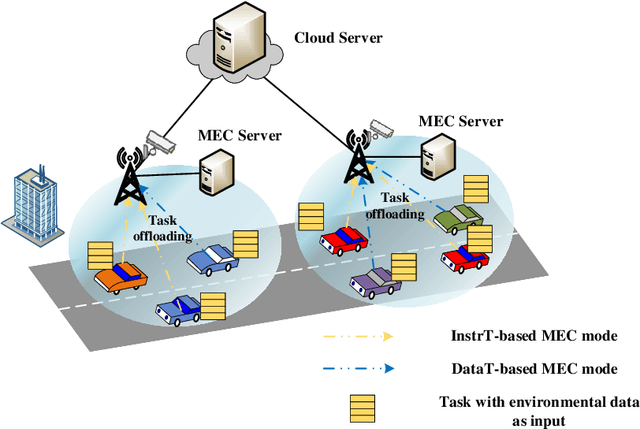



Abstract:Task offloading is a potential solution to satisfy the strict requirements of computation-intensive and latency-sensitive vehicular applications due to the limited onboard computing resources. However, the overwhelming upload traffic may lead to unacceptable uploading time. To tackle this issue, for tasks taking environmental data as input, the data perceived by roadside units (RSU) equipped with several sensors can be directly exploited for computation, resulting in a novel task offloading paradigm with integrated communications, sensing and computing (I-CSC). With this paradigm, vehicles can select to upload their sensed data to RSUs or transmit computing instructions to RSUs during the offloading. By optimizing the computation mode and network resources, in this paper, we investigate an I-CSC-based task offloading problem to reduce the cost caused by resource consumption while guaranteeing the latency of each task. Although this non-convex problem can be handled by the alternating minimization (AM) algorithm that alternatively minimizes the divided four sub-problems, it leads to high computational complexity and local optimal solution. To tackle this challenge, we propose a creative structural knowledge-driven meta-learning (SKDML) method, involving both the model-based AM algorithm and neural networks. Specifically, borrowing the iterative structure of the AM algorithm, also referred to as structural knowledge, the proposed SKDML adopts long short-term memory (LSTM) network-based meta-learning to learn an adaptive optimizer for updating variables in each sub-problem, instead of the handcrafted counterpart in the AM algorithm.
Digital Twin-Assisted Knowledge Distillation Framework for Heterogeneous Federated Learning
Mar 10, 2023



Abstract:In this paper, to deal with the heterogeneity in federated learning (FL) systems, a knowledge distillation (KD) driven training framework for FL is proposed, where each user can select its neural network model on demand and distill knowledge from a big teacher model using its own private dataset. To overcome the challenge of train the big teacher model in resource limited user devices, the digital twin (DT) is exploit in the way that the teacher model can be trained at DT located in the server with enough computing resources. Then, during model distillation, each user can update the parameters of its model at either the physical entity or the digital agent. The joint problem of model selection and training offloading and resource allocation for users is formulated as a mixed integer programming (MIP) problem. To solve the problem, Q-learning and optimization are jointly used, where Q-learning selects models for users and determines whether to train locally or on the server, and optimization is used to allocate resources for users based on the output of Q-learning. Simulation results show the proposed DT-assisted KD framework and joint optimization method can significantly improve the average accuracy of users while reducing the total delay.
The RSNA-ASNR-MICCAI BraTS 2021 Benchmark on Brain Tumor Segmentation and Radiogenomic Classification
Jul 05, 2021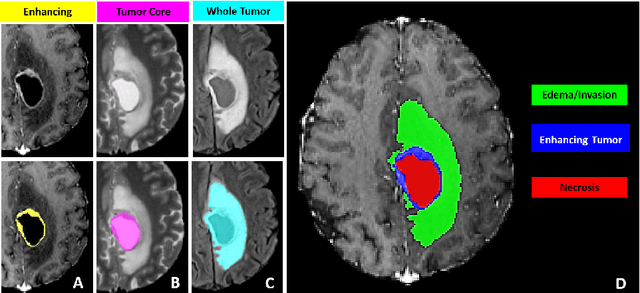
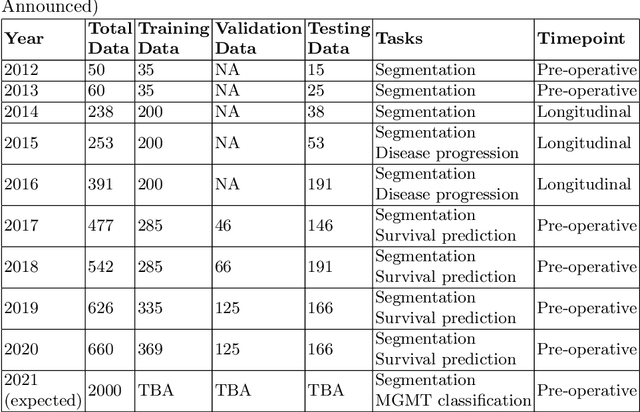
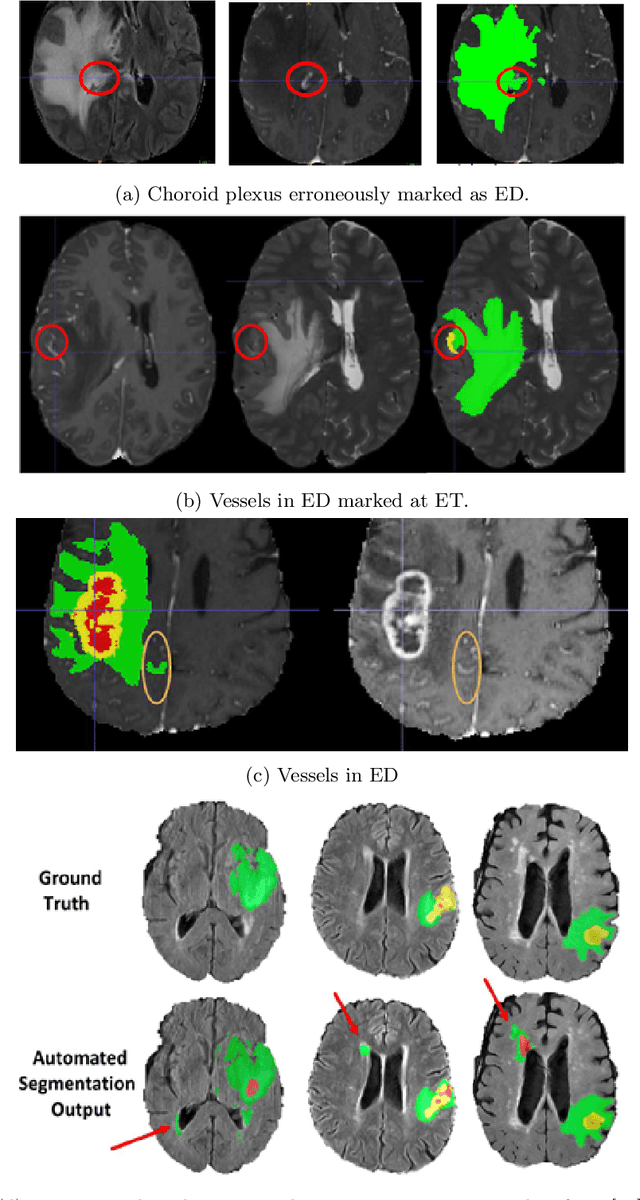
Abstract:The BraTS 2021 challenge celebrates its 10th anniversary and is jointly organized by the Radiological Society of North America (RSNA), the American Society of Neuroradiology (ASNR), and the Medical Image Computing and Computer Assisted Interventions (MICCAI) society. Since its inception, BraTS has been focusing on being a common benchmarking venue for brain glioma segmentation algorithms, with well-curated multi-institutional multi-parametric magnetic resonance imaging (mpMRI) data. Gliomas are the most common primary malignancies of the central nervous system, with varying degrees of aggressiveness and prognosis. The RSNA-ASNR-MICCAI BraTS 2021 challenge targets the evaluation of computational algorithms assessing the same tumor compartmentalization, as well as the underlying tumor's molecular characterization, in pre-operative baseline mpMRI data from 2,000 patients. Specifically, the two tasks that BraTS 2021 focuses on are: a) the segmentation of the histologically distinct brain tumor sub-regions, and b) the classification of the tumor's O[6]-methylguanine-DNA methyltransferase (MGMT) promoter methylation status. The performance evaluation of all participating algorithms in BraTS 2021 will be conducted through the Sage Bionetworks Synapse platform (Task 1) and Kaggle (Task 2), concluding in distributing to the top ranked participants monetary awards of $60,000 collectively.
 Add to Chrome
Add to Chrome Add to Firefox
Add to Firefox Add to Edge
Add to Edge